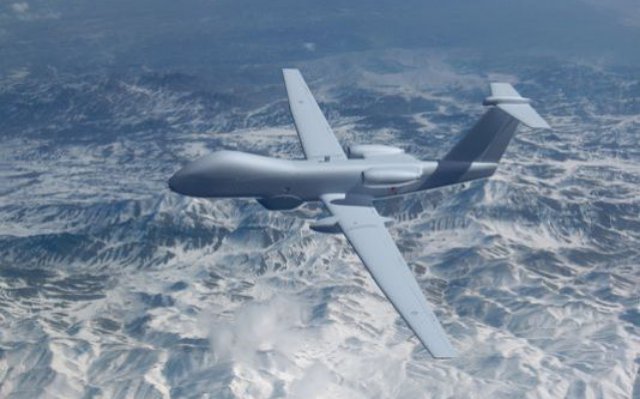 The German Defense Ministry is assuming the leadership role for development of a European drone, the so-called Medium Altitude Long Endurance Remotely Piloted aircraft system or MALE RPAS. In a statement, the ministry also announced that Spain will participate as an equal fourth partner in the project.
The German Defense Ministry is assuming the leadership role for development of a European drone, the so-called Medium Altitude Long Endurance Remotely Piloted aircraft system or MALE RPAS. In a statement, the ministry also announced that Spain will participate as an equal fourth partner in the project.
According to the ministry, Germany will take over 31 percent, or €18.6 million (US $20.3 million) of the cost of the definition study. France, Italy and Spain each will contribute €13.8 million to the study.
The German ministry further announced that on Nov. 25, the Organisation for Joint Armament Cooperation (OCCAR) was commissioned to manage the definition study for the MALE RPAS.
“There is a will to enter in the program. We will be in, but we still have to negotiate it,” a source from the Spanish MoD said. The same source told Defense News, “there is not a hurry about it, the decision will be adopted by the next government.”
On Dec. 20, Spain will elect a new president of government. The ruling center-right People’s Party is leading the polls, but to govern it might need a second party for support.
The two-year definition study will examine the operational requirements of the nations under a cost- and risk-based angle. Airbus Defence and Space, Dassault Aviation and Finmeccanica will then develop a system design. The study will be jointly executed by the three companies.
“There is already a clear plan, how to distribute the work packages between the parties,” an Airbus spokesman said. Contract signature for the study is expected in the first half of 2016.
After the study’s termination, the next development of the MALE RPAS — based on an industry proposal — should ideally be managed by a prime contractor. The other companies will be included as subcontractors, the German MoD stated. Airbus estimates development costs at about €1 billion. However, the results of the study would have to be considered first, a spokesman said.
Which of the companies involved will act as prime contractor is still an open question. The Germans support Airbus due to their “ministerial leadership” in the program. The company itself also seeks the position, the Airbus spokesman confirmed.
If the program proceeds as planned, the first systems may be delivered in 2025. The main task of the remotely piloted aircraft will be reconnaissance and surveillance, but it also will be armed if necessary.
While OCCAR will perform the preparatory work for the contract, the European Defence Agency supports the project in the fields of airspace integration and certification. The German MoD stressed that in the future, the project should not be limited to the four initiating countries. Participation of other European nations in the next phases is possible.
The foundations of the MALE RPAS were laid May 18, when the defense ministries of Germany, France and Italy signed a memorandum of understanding to develop a European drone by 2025.
In the summer, France and Germany held detailed talks, reaching an agreement that Berlin would hold a stake of just over 30 percent and leadership of the program, French procurement chief Laurent Collet-Billon told the French parliamentary defense committee in early October.
French Defense Minister Jean-Yves Le Drian sees the program as important, and the UAV is expected to fly a little before 2025, he said.
“The definition of the sensors will count just as much as the platform. We will pay close attention; our industry will be given full consideration in view of its high level of competence,” he said.
German Defense Minister Ursula von der Leyen stressed during an interview in June that the independent development of a drone is vital for Europe to avoid dependency on “other powers” in this field of technology.
By the end of the year, the German MoD wants to decide which drone will be procured as a temporary bridging solution until the MALE RPAS is available. While the co-governing Social Democrats want the Israeli Heron TP, the Conservatives are waiting for a military assessment before starting the political process.
Source: Defense News
